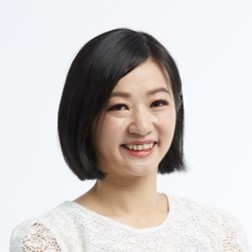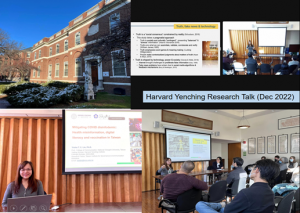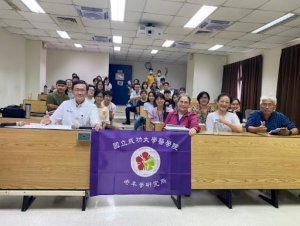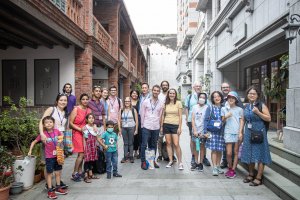CHAPTER 1 Where I Am From
I am TzuChun Lin, a 2019-2020 FLTA grant fromTaiwan. I started my magical journey at Georgia Southern University as a Chinese Instructor and an audit student. I had to teach Chinese 1001 three times a week and chose two to four courses as an audit student. In both fall and spring semester, I experienced how well-educated an American college student is, and how the university played a supportive role to help each student to become successful.
Taiwan, where most countries did not recognize us as a country, has the freedom of speech, press, religion and assembling. We can vote for our president, mayor, and public issues that are related to our rights. Taiwanese are kind, friendly and we can help the world in many different ways. During the pandemic of Covid-19, Taiwan showed caution of the virus ahead of all the other countries and set up a great model of how to prevent the spread of coronavirus.
CHAPTER 2 Foreign Language Teaching Assistant (FLTA)
The United States Department of State Bureau of Educational and Cultural Affairs (ECA) sponsors Fulbright FLTA Program. It is designed to develop Americans’ knowledge of foreign cultures and languages by supporting teaching assistantships in over 30 languages at hundreds of U.S. institutions of higher education. This year we had 22 excellent grants from Taiwan. We were working in different fields but we shared some similar traits such as confidence, independence, and enthusiasm for our country –TAIWAN.
CHAPTER 3 The Role I Played at GSU
Teaching Assistant
For the first term, I was a Chinese Teaching Assistant that helped Dr. ZZ with his CHIN 1001 and 1002 courses. Dr. ZZ is a fantastic professor that created a teaching method called “LTT” which made students to listen, to write and to understand Chinese in a short time. He always says, “Practice makes perfect.” He tried to teach students practical usage of the language by presenting popular public issues in his classes. It was my honor to have Dr. ZZ as my supervisor. I really had a nice time with him and learned a lot of teaching skills from him. Thank you, Dr. ZZ.
你好 Chinese Instructor
For the second term, I was the instructor of CHIN 1001 course. To raise their interests in learning, I used visual aids such as vocabulary cards and oral activities to let my students practice more. After winter break, we moved to online classes. I used Google Quiz to help them remember vocabulary and upload class videos on YouTube channel so that they could catch up anytime depending on their own learning pace . I had a great time with you. Thanks.
STEM Ambassador
It was my honor to be one of the STEM Ambassadors at GSU. Science is fun and interesting. My job was to show people the fascination of science by joining different events. For example, being a volunteer at STEM events, I demonstrated science games with kids to bring out their interests in science. I collected feedback from those kids to understand what fields they wanted to know more about, and I learned more knowledge of STEM education. It was a great chance for me to experience how Americans promote STEM and thanks for those who devoted themselves to science education.
CHAPTER 4 Culture Shock
One story may be judged based on different stereotypes so we cannot judge a country with a single story. As a Fulbrighter, one of our missions is to share our culture to enrich American’s perspective of the world. In addition, we can immerse ourselves in US culture and when we go back to our home country, we can present a clearer view to our next generation. We are all human beings on earth. In the United States, I felt respected, supported, and during the pandemic everyone opened their mind to share what they had and worked together to pass the hard time.
In the following paragraph, I will list seven lessons that foreigners must learn before they visit the United States.
First of all, American can turn on the AC anytime and set it to 68 °F while we have limited time using AC and set it as 78°F as a rule in Taiwan. Most Americans wear a suit on formal occasions so that the indoor temperature is usually set as 68 °F. Therefore, the first lesson for foreigners is to bring a jacket with you.
Secondly, American use their own unit to count length, weight, temperature, and distance. For example, the first time I saw the speed limit on Highway was 70 and I thought it was too slow. Later, I realized that 70 mph is equal to 110 km/h. Therefore, the second lesson for foreigners is units of measurement..
Thirdly, it is mandatory to pay tips in America while it is optional in Taiwan. time visitors usually make mistakes while tipping. Based on my experience , we don’t have to tip in fast food restaurants such as Burger King or Wendy’s but we would have to tip at a local restaurant that had a server to serve you. As for lunch, we have to tip at least15% and 20% for dinner. There are two ways to tip. First, most Americans pay with cards, the server would give you the bill first, and you just give the server your card. Then, the server would give your bill and card back, and you would have to write the amount of tips and add as a total. Finally, you could take your card back and leave. If you want to pay by cash, you would have to put your tips on the table before leaving. To sum up, the third lesson for foreigners is the art of tipping.
Fourthly, you could get a glimpse of American culture though eating with them. In America, you can order what you want without keeping others’ preferences in mind. For example, unlike in Asian cultures, Americans do not share their food while eating as a group and it is normal to pay separately at the end of the meal. Americans are willing to tip but they will somehow get the worth of the tips back. For example, if you order a drink at a restaurant, it is free to have the second one or even at the end of the meal, you can ask the server to refill it and take it out. Americans cannot live without ice. Taiwanese drink cold water, which means no ice is added in the water but Americans drink everything with ice. Therefore, the fourth lesson for foreigners is to try to live like Americans and rather than trying to change them, adjust yourself to fit in would be better.
Fifthly, Americans usually go grocery shopping once a week and it usually takes less than one hour to buy everything on the list. Therefore, Americans are used to making a shopping list in advance so when they arrive at the supermarket, they can just take what they need immediately. However, public transportation is more convenient in Taiwan, so I used to go to the supermarket every day or just went to the local market by bike. As a result of these differences, the fifth lesson for foreigners is to write everything you need down and think twice the day before your shopping day to make grocery shopping more efficient.
Sixthly, except for being in schools, most Americans do not recycle. They usually put everything in the trash can and then there would be a garbage truck coming to pick the garbage up a few times a week. In my experience, I would bring my own shopping bag when I go grocery shopping and I would recycle reusable trash at home and take them out separately. Thus, the sixth lesson for foreigners is to keep your good habits without needing to change yourself..
Finally, the United States of America was founded with diversity and there are laws to protect all kinds of rights. That is why Americans can proudly say, “I will sue you” whenever they feel violated. Therefore, the most important lesson is the taboo of the United States. For example, discrimination is a very serious issue and you shouldn’t joke about it. In addition, Americans care a lot about their privacy. Please get permission whenever you want to take a photo or film a video with other people being in them. Finally, Americans are very straightforward while communicating. For example, if you have any questions or problems, you should just ask instead of hiding your concerns. Thus, the last lesson for foreigners is the art of communication.
CHAPTER 5 Academic integrity
As a Fulbrighter, we have a chance to experience the students’ lives in the United States. We could take two courses per semester and we tried our best to meet the requirements that the professor set. After two semesters, I realized a few things of American Education.
Firstly, reading is the base of learning while questioning is the soul of understanding, and critical thinking is the key of acquisition. For example, each week we had to read a couple of articles, discuss during the class, and write critique in the end. Secondly, a support system is the key to success. “No child left behind” is not just a slogan but a real thing that happened in real lives. For example, if you are stuck with a course, you can take advantage of the professor’s office hour, the library’s tutor time, or you can talk with your supervisor. In addition, Americans care about your mental health and it is normal in the United States. You can go to the Counseling center anytime if you want to. Finally, it is hard to get a Bachelor degree in the United States; meanwhile, it presents the excellence of American education. University is where the best education took place
CHAPTER 6 American Privileges
What are American Privileges? There are the equity of human rights, the supportive Environment, and confidence and the ability to bounce back.
First of all, America was founded with diversity so equity for all races is the key to maintaining the peace of the US. Secondly, encouragement is a crucial part of American Culture. You might hear, “That was still a nice try”, “Keep going”, and “Try your best” very often. In Asian Culture, we always want people to be better or even the best whereas in the US, people want you to be your best. Thirdly, American is full of confidence and they can express their thoughts pretty well. Critical thinking is the soul of American Education and to make a public speech is essential to them as well. Finally, American Education puts emphasis on mindset, mindfulness, and the education of feelings. There are many picture books that teach kids how to express their emotions and to express them in a better way. Also, there are many resources for people who have mental problems. To sum up, cultures can’t be taught but be experienced. American culture is not McDonald’s, Starbucks, or Hollywood but diversity, respect, and confidence. To me, it was a thankful year. I would like to thank GSU professors who showed the warmest welcome to let me attend your classes. I would also like to thank the GSU faculties who offered a supportive working environment.
Thank you all for having a wonderful year with me.
Video: https://youtu.be/uGtsREam1cs
Managing editor: Ching-Chia Chen 陳敬佳







